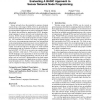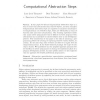29 search results - page 2 / 6 » An Interrogative Approach to Novice Programming |
CHI
2007
ACM
14 years 5 months ago
2007
ACM
If applications were able to detect a user's expertise, then software could automatically adapt to better match expertise. Detecting expertise is difficult because a user...
SC
2005
ACM
13 years 11 months ago
2005
ACM
In developing High-Performance Computing (HPC) software, time to solution is an important metric. This metric is comprised of two main components: the human effort required develo...
SENSYS
2009
ACM
14 years 4 days ago
2009
ACM
Sensor networks have the potential to empower domain experts from a wide range of fields. However, presently they are notoriously difficult for these domain experts to program, ...
JOT
2010
13 years 3 months ago
2010
ional Abstraction Steps Lone Leth Thomsena Bent Thomsena Kurt Nørmarka a. Department of Computer Science, Aalborg University, Denmark In this paper we discuss computational abstra...
VL
2009
IEEE
14 years 2 days ago
2009
IEEE
Little is known about the formation of people’s first perceptions about computers and computer code, yet it is likely that these impressions have a lasting effect on peoples’ ...


